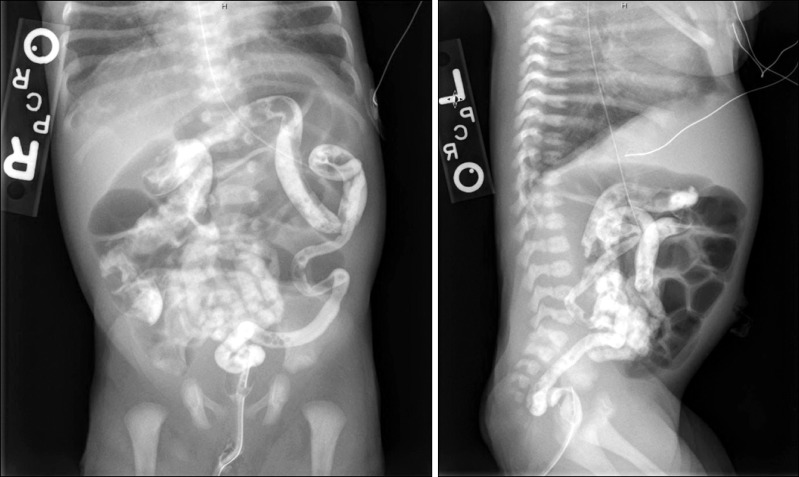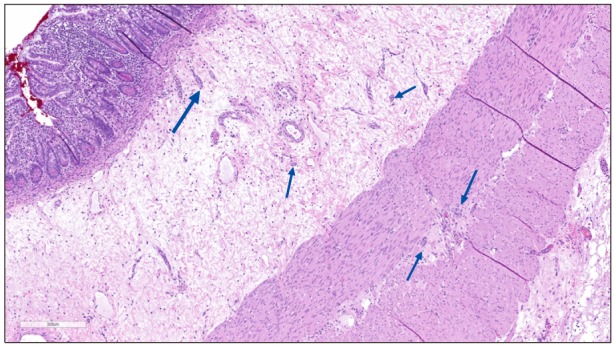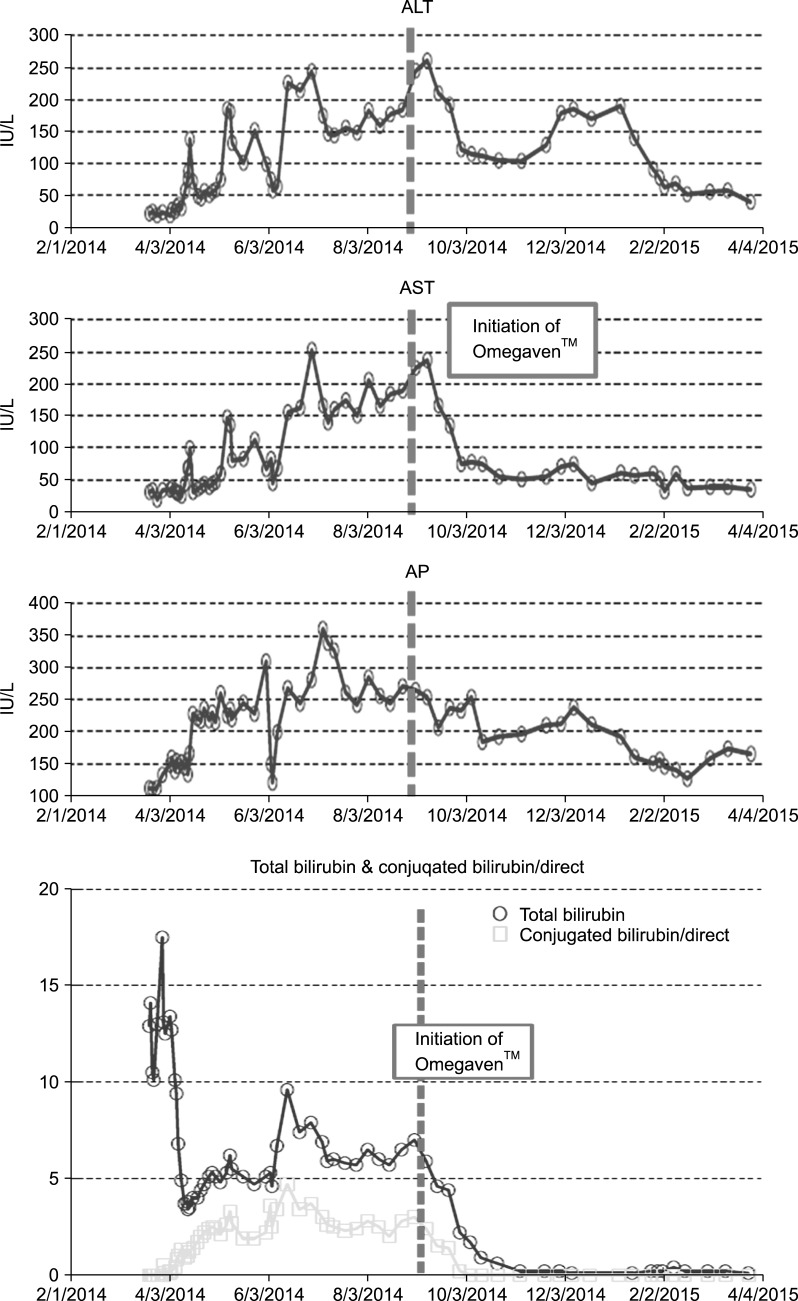Pediatr Gastroenterol Hepatol Nutr.
2017 Mar;20(1):55-60. 10.5223/pghn.2017.20.1.55.
Intestinal Hypoganglionosis Leading to Intestinal Failure and the Compassionate Use of Omegavenâ„¢
- Affiliations
-
- 1Department of Medical Education, Johns Hopkins All Children's Hospital, St. Petersburg, FL, USA. rkhalaf1@jhmi.edu
- 2Department of Gatroenterology, Hepatology and Nutrition, Johns Hopkins All Children's Hospital, St. Petersburg, FL, USA.
- 3Department of Surgery, Johns Hopkins All Children's Hospital, St. Petersburg, FL, USA.
- 4Department of Neonatology, Johns Hopkins All Children's Hospital, St. Petersburg, FL, USA.
- KMID: 2375279
- DOI: http://doi.org/10.5223/pghn.2017.20.1.55
Abstract
- Intestinal hypoganglionosis is a rare innervation disorder that provides numerous nutritional, medical and surgical challenges. In this case report, we present a case of a newborn with intestinal hypoganglionosis leading to intestinal failure and intestinal failure-associated liver disease who responded to Omegavenâ„¢, a fat emulsion comprised of omega-3 fatty acids. Omegavenâ„¢ has been shown to be beneficial in the management of cholestatic liver injury. Clinical success with Omegavenâ„¢ was seen in this patient with a clear decrease in aspartate aminotransferase, alanine aminotransferase, alkaline phosphatase and complete resolution of cholestasis with a direct bilirubin of zero within two weeks of initiation of Omegavenâ„¢. No current guidelines for the diagnosis and management of hypoganglionosis are available. We recommend a multidisciplinary approach and the use of novel therapies such as fat emulsions composed of omega-3 fatty acids for improved patient outcomes. Appropriate compassionate use protocols should be obtained from the Food and Drug Administration prior to initiation of Omegavenâ„¢.
MeSH Terms
-
Alanine Transaminase
Alkaline Phosphatase
Aspartate Aminotransferases
Bilirubin
Cholestasis
Compassionate Use Trials*
Diagnosis
Empathy*
Emulsions
Fatty Acids, Omega-3
Hirschsprung Disease
Humans
Infant, Newborn
Liver
Liver Diseases
Parenteral Nutrition, Total
United States Food and Drug Administration
Alanine Transaminase
Alkaline Phosphatase
Aspartate Aminotransferases
Bilirubin
Emulsions
Fatty Acids, Omega-3
Figure
Reference
-
1. Schäppi MG, Staiano A, Milla PJ, Smith VV, Dias JA, Heuschkel R, et al. A practical guide for the diagnosis of primary enteric nervous system disorders. J Pediatr Gastroenterol Nutr. 2013; 57:677–686. PMID: 24177787.
Article2. Dingemann J, Puri P. Isolated hypoganglionosis: systematic review of a rare intestinal innervation defect. Pediatr Surg Int. 2010; 26:1111–1115. PMID: 20721562.
Article3. Le HD, de Meijer VE, Robinson EM, Zurakowski D, Potemkin AK, Arsenault DA, et al. Parenteral fish-oil-based lipid emulsion improves fatty acid profiles and lipids in parenteral nutrition-dependent children. Am J Clin Nutr. 2011; 94:749–758. PMID: 21775562.
Article4. Park HW, Lee NM, Kim JH, Kim KS, Kim SN. Parenteral fish oil-containing lipid emulsions may reverse parenteral nutrition-associated cholestasis in neonates: a systematic review and meta-analysis. J Nutr. 2015; 145:277–283. PMID: 25644348.
Article5. Raptis DA, Limani P, Jang JH, Ungethüm U, Tschuor C, Graf R, et al. GPR120 on Kupffer cells mediates hepatoprotective effects of ω3-fatty acids. J Hepatol. 2014; 60:625–632. PMID: 24262133.
Article6. Venick RS, Calkins K. The impact of intravenous fish oil emulsions on pediatric intestinal failure-associated liver disease. Curr Opin Organ Transplant. 2011; 16:306–311. PMID: 21505340.
Article7. Kelly DA. Liver complications of pediatric parenteral nutrition--epidemiology. Nutrition. 1998; 14:153–157. PMID: 9437702.
Article8. Lacaille F, Gupte G, Colomb V, D'Antiga L, Hartman C, Hojsak I, et al. Intestinal failure-associated liver disease: a position paper of the ESPGHAN working group of intestinal failure and intestinal transplantation. J Pediatr Gastroenterol Nutr. 2015; 60:272–283. PMID: 25272324.9. Calhoun AW, Sullivan JE. Omegaven for the treatment of parenteral nutrition associated liver disease: a case study. J Ky Med Assoc. 2009; 107:55–57. PMID: 19263944.
- Full Text Links
- Actions
-
Cited
- CITED
-
- Close
- Share
- Similar articles
-
- A Case of Chronic Idiopathic Intestinal Pseudoobstruction
- A Case of Colonic Hypoganglionosis in Adult
- Three Cases of Colonic Segmental Hypoganglionosis : Case Reports With a Review of Previously Reported Cases in Korean Literatures
- A Case of Colonic Hypoganglionosis Complicated with Colonic Ulcers
- A Case of Adult Type Colonic Hypoganglionosis




